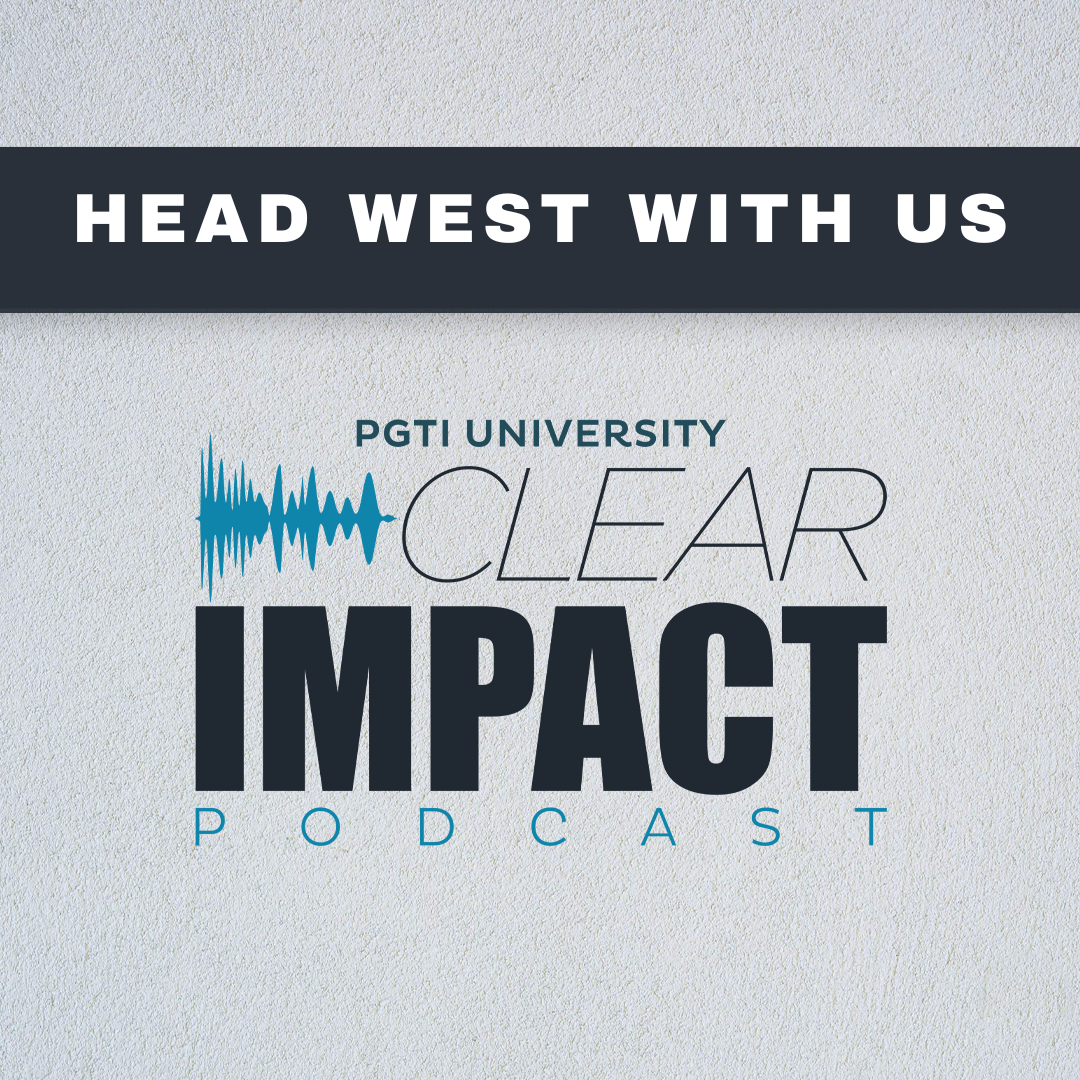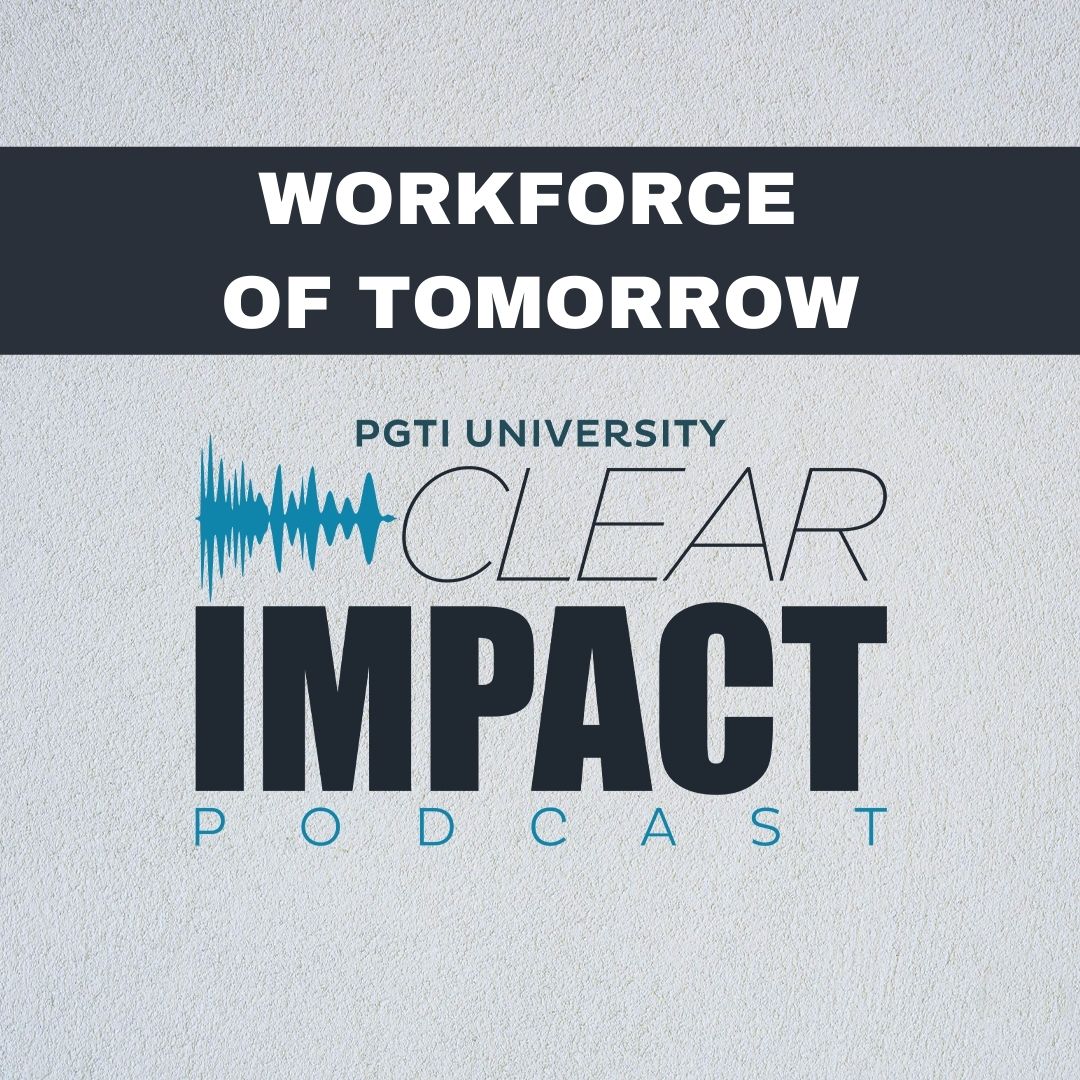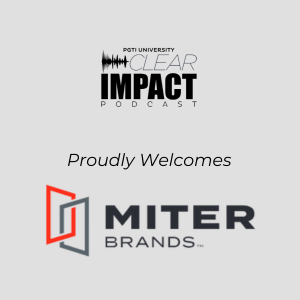Episode Transcript
[00:00:09] Speaker A: Welcome to the Clear Impact podcast brought to you by PGTI University. Thanks for joining us today. My name is Sherri Connor and I am your host.
[00:00:24] Speaker B: Good morning.
[00:00:25] Speaker A: We are here on the Clear Impact.
[00:00:27] Speaker B: Podcast and we are in a series of introducing Mitre to our audience. And today I have the privilege of sitting with Matt de Soto. Matt, welcome to the studio.
[00:00:38] Speaker C: Thank you so much. Glad to be here.
[00:00:40] Speaker B: Yeah, no sunshine today, unless you count liquid sunshine, but we're grateful for the rain. So thanks for making some time to come in and chat with me.
[00:00:48] Speaker A: We're just wanting to get to know you. Who are you?
[00:00:52] Speaker B: Where did you grow up? Tell us about your history, your education, your family, whatever you want to talk about in the time that we have.
[00:00:58] Speaker C: Yeah, the who am I is a very deep question. Who knows how I can, or God knows I should say I can answer that in many ways. So I grew up in central Pennsylvania and still live there today, near Harrisburg, very small town called Millersburg. So our town population is maybe two or 3000 people.
[00:01:18] Speaker B: Okay.
[00:01:18] Speaker C: So very small. And it's close to the vinyl extrusion plant that mitre has for the eastern part of the country. So I grew up in a town maybe 10 miles away called Elizabethville, and I've only known one thing, and that is windows and doors. So I grew up in a family that my dad had worked there since he was 16 years old. And actually, ironically, he started in Clearwater, Florida, and he was sweeping floors, sort of doing janitorial work, and then worked his way through some different jobs, high school and through university and then post university, he got offered a role to go out to California and worked in a window screen plant there and then moved to Missouri and then ultimately ended up in central Pennsylvania for a window and door fabricator that we became a window screen supplier to them. So in 1966, he and my mom moved to central Pennsylvania. So I was born in 77. And so I've never ever known a life different than windows and doors or anything that goes into them. And, yeah, so I'm really pleased to have grown up there in a small town, rural central Pennsylvania now. A lot of Amish buggies rolling by and just a really cool place to be. And so today I've got my wife, Desiree, and then we've got three kids, Caroline, who is 14, Grady, who just turned 13, and then Stella, who will be turning twelve. And we also have three dogs, Dasher, Blitzen and snow cone. Oh, gosh, there's a theme there. And we've got two guinea pigs and tiny Tim and figgy pudding and one cat, Layla.
[00:02:58] Speaker B: Oh gosh.
[00:02:59] Speaker C: Busy home.
[00:03:00] Speaker B: So lots of middle school energy in your house.
[00:03:04] Speaker C: That's one way to put it, yeah.
[00:03:06] Speaker B: The only thing worse than being the parent of a middle schooler is being the middle schooler. So that was the logic I used when my kids were those ages.
[00:03:15] Speaker C: So, yeah, that's good advice. I think I'll call my wife, post this discussion and share that. Cause we had a call this morning and she was venting a bit about middle school life.
[00:03:25] Speaker B: Yeah, I remember giving my daughter a big lecture as she was my younger daughter, as she was going into 8th grade. I said, listen, this is your last year in middle school, so this is it. This is the middle school drama that you're allowed. And then next year that's it, there's no more. And she was like, okay.
[00:03:44] Speaker C: I'm sure that went great.
[00:03:45] Speaker B: You know, it was pretty good. She did pretty well. But anyway, so you're the CEO, so that means you just have a lot of really talented, smart people underneath you and you get to just make sure everybody's checking the boxes or how do you see your role?
[00:03:59] Speaker C: It's a good question. Very rare do I ever introduce myself with my title more just want to talk with folks and meet them and understand what they do, whether that be a team member, customer, supplier, or anybody in the community. So I think that though the role of a CEO is number one, first and foremost is, I do believe that there is a concept of tone from the top. If so, if you lead by example and don't ever ask anybody to do something that you wouldn't personally do, I think it does establish a presence that says, all we're really wanting to do is build better. So we are where we are and together we're going to figure out how to build something better today and tomorrow and the next day after that and so on and so forth. So really finding great people that I get a chance to work with, work beside. I tell my children all the time, they've sometimes referred to me as the boss. And I'm like, no, no, bosses are not nice people. Leaders are who we want to work with. People that set a tone and lead by example and hopefully are inspiring other folks to think bigger than what they otherwise would have thought and give them the right tools to help execute and achieve all the things they want to do. We have some amazing people. That's what builds the business. Machines don't build it. Buildings, systems, none of that stuff builds the business. We need those things, but it's people. And so my role is just to help them figure out what they need and then give them support and help them along the journey.
[00:05:25] Speaker A: We are sharing our expertise around all topics relating to the window indoor industry. Whether you are a customer selling our products or a homeowner doing research, the Clear Impact podcast provides helpful content that makes an impact. Subscribe today wherever you listen to podcasts.
[00:05:43] Speaker B: Well, so far, it's been really pleasant. Interactions that I've been able to have with any of the Mitre leadership has just been stellar, and there's always a nervousness around new leadership and new ownership and wait, what? What are we doing? And, you know, I've been in the community for a long time, and a lot of people obviously knew that we were bought out. And they're like, are you okay? Is your job? I'm like, yeah, everything's great. We're fine. Like, you know? And they're like, oh. Like, it's almost like a given that there's going to be some fear. And that's not been my experience at all. And most of the people that I've interacted with all have a very positive feeling around our new teammates. Not them, not, you know, us. Them. It's the US. Everyone's great. So I'm excited about what can look like, you know, six months from now, a year from now, five years from now. And so, anyway, I did want to just ask you, what are you most excited about in working with the PGTI brands and people?
[00:06:41] Speaker C: Well, first, I would be remiss if I didn't say that this whole journey has been just remarkable. It's like a dream come true. Candidly, you know, many years ago, we were in Sarasota. I believe we were at a Stanley Marriott courtyard. I don't know why I remember that, but I had just had dinner with Rod and Jeff, and I think it was just the two of them and my dad and myself, my brother and another leader, Stan Sullivan. And we came back after dinner, and we were sitting in the lobby, just hanging out, you know, sort of debriefing, post the dinner conversation. Then my dad had said, hey, it would really cool if we could figure out somehow, some way to put Mi Milgard and PGT together. Those would be three really great brands that belong together if you were, in fact, wanting to consolidate the space. So that was in 2017, and then, of course, 2019. We were fortunate enough to have earned the Milgard opportunity and then not too short after that. Rather, we were able to put PGTI and Mitre together. And so this whole journey has really been many years in the making. So now to see it come to life and to see the team members interacting and meeting customers and working with our suppliers to help build better relationships and stronger and bigger relationships, it's really been quite humbling. I guess I would say the coolest part is just getting a chance to know the PGTI team members. And we had thought that there was a lot of cultural similarity, but outside looking in, you really don't ever totally know because sometimes there can be a facade or who knows? But we thought that there were many aspects of the business in the team that made total sense and aligned perfectly the way Mitre had thought before the acquisition. But there are also some things that we had felt maybe we could bring to the combination that would hopefully add value for everyone, the team, the customer, supplier and the community. And I'm early on here now, two and a half months in, I feel like we're seeing some of that come to life.
[00:08:28] Speaker B: Well, and so far it feels very much the same. You know, you have a great passion for the foundation. We've had a great passion for giving back to our community partners. You know, you believe in promoting, in leadership from within and growing people from, you know, not just a job, it's a career. And that's been a big part of PGTI and just having the value for the customers and developing those strong relationships with vendors. And so it does feel very much like we're in alignment. So I think that's probably why it does feel so smooth. You know, it's not like we're in a completely different space or culture, although there are some adjustments, obviously, but it feels good so far.
[00:09:06] Speaker C: I'm glad to hear that. Yeah, we want that. Hopefully, a lot of our team members are feeling, hopefully all, but at least most are feeling that exact same way.
[00:09:13] Speaker B: Everyone I've talked to seems to feel that way and I talk to a lot of people.
I'm behind a screen a lot of the time, but I'm out on the mezzanine and talking and involved in the sales support area. So, yeah, a lot of good vibes from that. And so I do have one question, and I ask this of all leaders, and it's around the topic of advice. And so what is a great piece of advice that you've received that you'd like to share with us?
[00:09:37] Speaker C: It's a great question. Just this morning I was catching up with a couple of team members over a cup of coffee, and we were just chatting about different things we'd heard through life and a couple of things have come to mind, but different folks that I feel like have had an impact on my life. One is sort of this concept of too dumb to know better. And on the surface it sounds like. So are you telling me you're an idiot?
Hopefully that's not what you'll take away after we catch up for a little bit, although I have my shortcomings, but the concept of, like, don't be afraid, just sort of approach things and who knows what we're going to uncover. And sometimes the most simple question and most obvious question can show you so many wonderful outcomes and great opportunities to improve. So, again, on the surface, it sounds like, so you're telling me too dumb to know better. Well, now, I really think as you sort of peel the onion back there a little bit, it's saying, really just be comfortable asking people things that feel like they're, again, obvious or potentially silly. But at the same time, maybe somebody has never asked that before or helped someone look at something so obvious in a different way. And it can improve a lot of outcomes for whatever it is, whether it's work or personal or who knows. And then the other one that I've heard and I really appreciate is that having a life of meaning, like, whatever it is that we choose to do, just make sure that it's got, like, meaningful opportunity and outcome for whoever it is that we're working with or doing things with, that wake up with a purpose and make sure it's meaningful again. Whatever it is that we're doing, whether it's something on our personal journey, family journey, or our professional journey, that just have a life of meaning, those are beautiful things.
[00:11:17] Speaker B: I love that. That's kind of the opposite of what my previous employer said. And this would usually be around, you know, a copy machine jam or something silly like that. And he would say, you only have to be 10% smarter than what you're working on.
So that's kind of a flip of too dumb to know better, but interesting. That's what popped into my mind when you were saying that. So I think it's just the humility to ask and the willingness to say, I don't know. And sometimes that's hard as part of the education team. That's our greatest hurdle, is that people already think they know. And if you're not open to learning, then, yeah, you can't do much with that.
[00:11:56] Speaker C: Yeah. No, so many times I think we're maybe taught early on in life that if you ask something that you get your wrist slapped or made fun of, or who knows? And I guess that's part of growing and learning, too, is okay, that can happen. But more than not, when we ask somebody what they're thinking or sort of share an observation, not only are they interested that we're interested, but also we can learn a lot about. About whatever it is that we're focusing on and trying to improve.
[00:12:24] Speaker B: Yeah. Thank you. This has been an amazing conversation today. Is there anything else you want to share? Are we good?
[00:12:29] Speaker C: No, the last thing I'll share is that I just appreciate having the chance to give some perspective. But more than anything else, I just want our customers and our team and suppliers and the communities in which we operate to know that we are very focused on just becoming better every day. And we have a vision, very clear vision, very clear common purpose, quality pillars, and we all wrap that all up in what we call our guiding principles. But I think a lot of people put those things on the wall in a frame and then it's like, okay, that's there. But I really do believe that mitre team members, we've got to be focused on having those come to life and for everything that we do. And, you know, it's been, been a really remarkable experience thus far and rewarding path and journey, and I'm not done. So we've got a lot of folks that have high expectations and certainly I want to make sure we help support their journey as well.
[00:13:13] Speaker B: Yeah, no, this is exciting. It's definitely an amazing time to be here, for sure.
[00:13:18] Speaker C: Cool.
[00:13:19] Speaker B: All right, well, thank you for your time, Matt. It's been great getting to know you a little bit and appreciate everything that you're doing. And your approachability is awesome. And, you know, like, I didn't even know for sure if we were going to get a chance to do this today. And you're like, yeah, so I can just come with Joe. I'm like, no, no, no. Separate. And you're like, okay, thank you. So I appreciate that.
[00:13:40] Speaker C: Oh, good. Well, thanks for having me.
[00:13:41] Speaker B: All right, have a great day.
[00:13:42] Speaker C: You too.
[00:13:43] Speaker B: All right, bye.
[00:13:48] Speaker A: The Clear Impact podcast is brought to you by PGTI University. We are a part of Mitre Brands, a family of leading window and door brands united by our passion for quality and relentless pursuit of 100%. One of the missions of Miter brands is to unite and deliver the finest customer experience possible across the nation. Our window and door brands deliver regionalized expertise and products backed by a national company. PGTI University is here to educate you, our listener, so that you can be a more informed consumer of window and door products.


